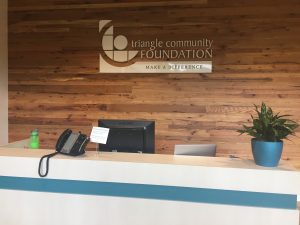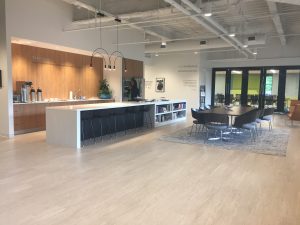
Hello everyone! I’m Shelli and I will be sharing some insight into my summer work experience at the Triangle Community Foundation (TCF) with you all every Thursday for the next few weeks! I could not be more thrilled to be a Shannon St. John Fellow at the Foundation (and not just because their new office is located in the Frontier, which means constant access to The Farmery, communal work spaces with bike desks, and food truck Fridays). This feels like a particularly exciting time to be working at the organization as they are undergoing a strategic planning process, which has already exposed me to great conversations around equity, leadership, capacity building, and inclusion. My first few days in the office have already assured me this is the kind of organization I want to work in after I graduate – one with a philosophy of servant leadership that partners with donors, community members, and nonprofits to create systematic change in the community.
This summer I will predominantly be working with the Community Engagement Team, as well as partnering with the Development Team members. My main projects will be exploring how to enhance community knowledge, such as donor education opportunities, and creating recommendations for future events around this area. This cross-section between donor relations, community engagement, and outreach fits incredibly well with my interests and has me excited to dive in!

However, this week I wanted to focus on a discussion I was able to be a part of on my first day – a cross-sector dialogue on understanding nonprofit capacities facilitated by NC State’s Institute for Nonprofits. This conversation is part of a research project, initiated and funded in part by TCF, in hopes to understand how foundations can better serve the needs of the nonprofits they fund. This conversation included a variety of voices – from nonprofit leaders, to donors, to government officials – that created space for honest conversations about the truth behind capacity building, and the challenges nonprofits face in the current environment. Administration costs and “overhead” are often viewed negatively by donors and other stakeholders who want as much money as possible to be going directly to the cause. However, what I gleaned from a lengthy day of tough conversations is while giving directly to the cause is important, it is not that simple. Overhead or indirect funds are vital to the success of the nonprofit and, by extension, the causes they serve. Having room in the budget to allocate for capacity building (such as staff training, board development, or IT investments) is imperative to the future of the nonprofit sector. It was refreshing to hear so many different perspectives join together to come to the same general conclusion – the public conversation around capacity building in nonprofits needs to change for these organizations to thrive.

